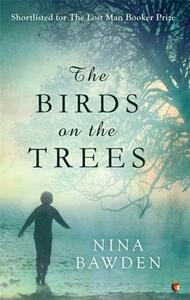Take a photo of a barcode or cover
I loved this book as a teenager, too scared to read it again now just in case, but I still think it is one of the most perceptive books I've ever read about what it feels like to be a child
Interesting use of alternative POVs throughout, but at times confusing. And I was left at the end wondering what the point of the book was.
emotional
reflective
medium-paced
Plot or Character Driven:
A mix
Strong character development:
Yes
Loveable characters:
No
Diverse cast of characters:
No
Flaws of characters a main focus:
Yes
Note for myself more than anything. Interesting observational novel about hypocrisy, relationships and mental health. I found it a bit unclear in sections which people were being described, which I found distracting. Enjoyed the plot.
I liked this but am curious how it got on my "to read" list. Not like things I usually read.
Things I liked: interesting multiple perspectives; fascinating view of the inner workings of a family, including what's awkward and frustrating and frightening.
Things I didn't like: sometimes seemed disjointed; sometimes frustrating that not much happened over the course of many pages at a time.
I'm guessing this book would have been easier to read in real book form. I don't know but I'm guessing the Kindle version is missing some black lines to indicate pauses and changes in speakers.
Things I liked: interesting multiple perspectives; fascinating view of the inner workings of a family, including what's awkward and frustrating and frightening.
Things I didn't like: sometimes seemed disjointed; sometimes frustrating that not much happened over the course of many pages at a time.
I'm guessing this book would have been easier to read in real book form. I don't know but I'm guessing the Kindle version is missing some black lines to indicate pauses and changes in speakers.
Quite a peculiar book, even by Bawden standards. Oddly juxtaposed chapters with several generations, the supposed junkie skizophrenic taking responsibility, the infidelities rife in Bawden... A coherent tale with not enough reason for being.
Quite a peculiar book, even by Bawden standards. Oddly juxtaposed chapters with several generations, the supposed junkie skizophrenic taking responsibility, the infidelities rife in Bawden... A coherent tale with not enough reason for being.
SUMMARY - Another chilly-hearted glimpse into middle-class life that deals with counterculture and antipsychiatry. It's more clinical than empathetic, though, and its the class hangups that feel most real.
A book written in a similar vein to some other Booker Prize-shortlisted novels of the early 1970s. Like others by Bernice Reubens and Dorris Lessing, Bawden explores mental illness through the filter of anti-psychiatric questioning on how far family life and social conformity are themselves the sickness, rather than the 'free' subjects they seek to label.
I especially enjoyed Lessing's more experimental 'Briefing for a Decent into Hell', but Bowden here gives us a much more conventional domestic and neighbourly tale of a dysfunctional family. The character who is diagnosed in the novel (without giving too much away) seeks to escape the expectations of others. In contrast those who do the labelling are often shown to be hypocrites, cold, or self-serving.
There is cuttingly cold middle-class dialogue, which seems to be another feature of several early 1970s Booker nominees. The Sunday dinner scene where the aunt is savaged but they still sit and eat felt more overdone than the vegetables they were no doubt eating at the time. Why didn't she leave? It made a point about the unhealthiness of 'respectable' middle class modes of behaviour within the plot, but I found it harder to believe. By the end none of the characters are endearing, which makes it harder to care about the action. Occasionally (cf Iris Murdoch) I have read books where we are meant to dislike the character, but I've still enjoyed the book. That's hard to pull off, and Bowden for me only got part of the way there. I was diverted but not fully won-over.
A book written in a similar vein to some other Booker Prize-shortlisted novels of the early 1970s. Like others by Bernice Reubens and Dorris Lessing, Bawden explores mental illness through the filter of anti-psychiatric questioning on how far family life and social conformity are themselves the sickness, rather than the 'free' subjects they seek to label.
I especially enjoyed Lessing's more experimental 'Briefing for a Decent into Hell', but Bowden here gives us a much more conventional domestic and neighbourly tale of a dysfunctional family. The character who is diagnosed in the novel (without giving too much away) seeks to escape the expectations of others. In contrast those who do the labelling are often shown to be hypocrites, cold, or self-serving.
There is cuttingly cold middle-class dialogue, which seems to be another feature of several early 1970s Booker nominees. The Sunday dinner scene where the aunt is savaged but they still sit and eat felt more overdone than the vegetables they were no doubt eating at the time. Why didn't she leave? It made a point about the unhealthiness of 'respectable' middle class modes of behaviour within the plot, but I found it harder to believe. By the end none of the characters are endearing, which makes it harder to care about the action. Occasionally (cf Iris Murdoch) I have read books where we are meant to dislike the character, but I've still enjoyed the book. That's hard to pull off, and Bowden for me only got part of the way there. I was diverted but not fully won-over.
reflective
slow-paced
Plot or Character Driven:
Character
Strong character development:
No
Loveable characters:
No
Diverse cast of characters:
No
Flaws of characters a main focus:
No




